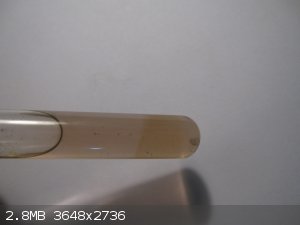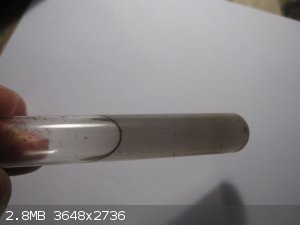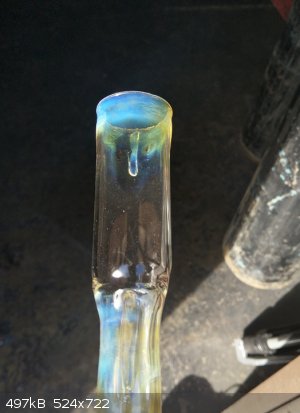12thealchemist
Hazard to Others
  
Posts: 181
Registered: 1-1-2014
Location: The Isle of Albion
Member Is Offline
Mood: Rare and Earthy
|
|
Silver nanoparticles
My Master's research has been focused mainly on univalent gallium chemistry, but as a byproduct of forming Ga(I), silver nanoparticles are routinely
produced. These are of little interest for the project, but I figured I would try to make some at home using hobby-chemist friendlier techniques
(anhydrous toluene (<5 ppm H2O) and silver triflate anyone?).
I measured out a small amount of 2 M nitric acid into a test tube, and added pieces of sterling silver until no more dissolved. By my calculations,
this should give an ~1 M solution of silver nitrate:
Ag + 2 HNO3 --> AgNO3 + NO2 + H2O
I took small samples (~1 mL) of this solution, and diluted with DI water to varying degrees - 1:1 seemed to work reasonably well. Citric acid (~100
mg) was then added, followed by partial neutralisation with sodium bicarbonate (~150 mg). The resulting solution appeared to be reasonably stable,
with no colour changes over a period of several hours. I then added formic acid (~1 mL, 37%) as a reducing agent. At room temperature, after 30
minutes a light brown colour was apparent, which slowly darkened culminating in a black precipitate after about 3-4 hours. Dilution appeared to slow
the process, while concentration unsurprisingly accelerated it. The light brown colouration I saw is identical to the silver nanoparticles I generated
in the university lab, and the stability (or lack thereof) similar.
I started this thread since there were none similar on the forum, the following two being the only ones:
Test to confirm the presence of silver nanoparticles?
how to increase the mass/weight of copper nanoparticles
My measurements are not exact because I did the experiments mainly by eye, with the intention of nailing down quantities later. The numbers given are
pretty close, ±20 mg, ±0.1 mL having measured out for this post.

Silver nanoparticles

After ageing for a few hours
|
|
|
woelen
Super Administrator
        
Posts: 8027
Registered: 20-8-2005
Location: Netherlands
Member Is Offline
Mood: interested
|
|
If you used sterling silver (which normally is 0.925 fine) then you have 7.5% of other metals (mostly copper I assume). Doesn't this interfere with
your experiments? You could try repeating the process with pure silver (e.g. from a silver coin like Eagle or Maple Leaf) or from pure (99.9+%)
element samples, which sometimes appear on eBay, or with silver nitrate.
I also once had such a brown solution, when I tried to make a delicate silver mirror. Instead, I obtained a brown liquid, which over time turned black
and after a longer time it became colorless and a thin layer of black precipitate was at the bottom. Apparently, it is very hard to make stable
colloidal silver.
I also made colloidal gold (with citrate) and this works well. I get pink/purple solutions, which do deposit a little amount of precipitate, but what
remains is a stable beautifully colored pink/purple solution, which can be ampouled and can be kept for years without any change.
|
|
|
DrP
National Hazard
   
Posts: 625
Registered: 28-9-2005
Member Is Offline
Mood: exothermic
|
|
Sorry - I couldn't help reading that in the voice of Renfield. 
"Yesss Master! The research into the nanofication of the silver particles to defeat the werewolves is progressing as planned. We should be ready to
deploy them by the next full moon"
\"It\'s a man\'s obligation to stick his boneration in a women\'s separation; this sort of penetration will increase the population of the younger
generation\" - Eric Cartman
|
|
|
12thealchemist
Hazard to Others
  
Posts: 181
Registered: 1-1-2014
Location: The Isle of Albion
Member Is Offline
Mood: Rare and Earthy
|
|
Quote: Originally posted by woelen  | If you used sterling silver (which normally is 0.925 fine) then you have 7.5% of other metals (mostly copper I assume). Doesn't this interfere with
your experiments? You could try repeating the process with pure silver (e.g. from a silver coin like Eagle or Maple Leaf) or from pure (99.9+%)
element samples, which sometimes appear on eBay, or with silver nitrate.
I also once had such a brown solution, when I tried to make a delicate silver mirror. Instead, I obtained a brown liquid, which over time turned black
and after a longer time it became colorless and a thin layer of black precipitate was at the bottom. Apparently, it is very hard to make stable
colloidal silver.
|
It doesn't seem to interfere too much with my experiments. I haven't noticed any copper nanoparticles, and it was meant to be more of a test reaction
than anything else. However, it seemed to work well enough to report on here. I do have pure silver; I was just being lazy.
I think that when the glass surface isn't clean enough, the nanoparticles remain in suspension rather than uniformly depositing on the surface of the
glass. Also the residual solution also tends to be brown in colour. Additionally, I have noticed mirroring on the glassware from my toluene solutions.
DrP: I am highly amused  
|
|
|
Simoski
Hazard to Self
 
Posts: 82
Registered: 24-12-2017
Location: Johannesburg South Africa
Member Is Offline
Mood: No Mood
|
|
Silver nanoparticles sprayed onto a female cannabis plant will make the affected area produce male pollen sacks.
|
|
|
Chemetix
Hazard to Others
  
Posts: 376
Registered: 23-9-2016
Location: Oztrayleeyah
Member Is Offline
Mood: Wavering between lucidity and madness
|
|
Silver nano and glass
Silver is a really important part of the colour spectrum with glass. As a vapour deposit it can create a wide range of colour as iridescence. Nano
structures are a part of how the colour is generated. There's a lot we don't know about the formation and the structures responsible for the colour
and it's development as it's a mixture of chemistry of the glass and it's physical states at temperature which all contribute to the shades and hues.
This is a sample of the effect but the artist who has the techniques they have honed with experience can control what you see with expert precision.
Look up borosilicate fume for examples of other peoples work. Gold vapour also has an iridescence that can be combined with silver that adds to the
effect, you'll see examples of that in your search.

Just because it popped into my feed recently here's a guy's instagram who is pretty good with the fume technique @woodchuckglass
[Edited on 3-4-2019 by Chemetix]
|
|
|
fusso
International Hazard
    
Posts: 1922
Registered: 23-6-2017
Location: 4 ∥ universes ahead of you
Member Is Offline
|
|
Quote: Originally posted by Simoski  | | Silver nanoparticles sprayed onto a female cannabis plant will make the affected area produce male pollen sacks. |
how did you discover this wwwww
|
|
|
Herr Haber
International Hazard
    
Posts: 1236
Registered: 29-1-2016
Member Is Offline
Mood: No Mood
|
|
Looking up how feminized seeds are made I'll wager 
|
|
|
Simoski
Hazard to Self
 
Posts: 82
Registered: 24-12-2017
Location: Johannesburg South Africa
Member Is Offline
Mood: No Mood
|
|
Exactly 8 )
|
|
|
Simoski
Hazard to Self
 
Posts: 82
Registered: 24-12-2017
Location: Johannesburg South Africa
Member Is Offline
Mood: No Mood
|
|
Which I think in terms of organic life is actually amazing
[Edited on 4-4-2019 by Simoski]
|
|
|